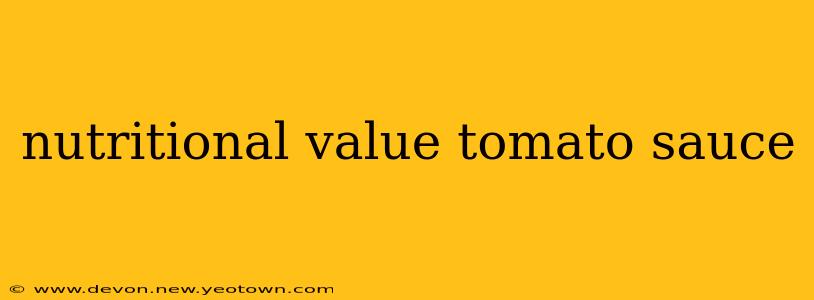Tomato sauce, that humble staple in countless kitchens worldwide, is far more than just a flavor enhancer. It's a nutritional powerhouse packed with vitamins, minerals, and antioxidants that contribute to overall well-being. Let's peel back the layers and explore the surprising nutritional value hidden within this everyday condiment.
My name is Elena, and as a registered dietitian with a passion for culinary nutrition, I've spent years exploring the hidden benefits of common foods. Today, we'll uncover the secrets of tomato sauce, dispelling myths and highlighting its often-overlooked nutritional contributions.
What are the main nutritional benefits of tomato sauce?
The nutritional profile of tomato sauce is heavily influenced by the ingredients used – whether it's a simple homemade version or a commercially produced one. Generally speaking, however, a good quality tomato sauce boasts impressive nutritional benefits, primarily due to its high concentration of lycopene. This powerful carotenoid is a potent antioxidant associated with a reduced risk of several chronic diseases. Beyond lycopene, tomato sauce also contributes valuable vitamins and minerals, including vitamin C, vitamin K, potassium, and folate. These contribute to various bodily functions, from immune support to bone health.
Is tomato sauce good for weight loss?
This is a question that often sparks debate. The answer is: it depends. Tomato sauce itself is relatively low in calories. However, the addition of fats, oils, sugars, and salt during processing can significantly impact its overall caloric density. A homemade tomato sauce, made with fresh tomatoes and minimal added ingredients, is a far healthier option for weight management compared to commercially produced sauces that are often laden with added sugars and sodium. In moderation, a low-sodium, low-sugar tomato sauce can be a healthy addition to a weight-loss diet as part of a balanced meal plan.
Does tomato sauce contain a lot of sugar?
The sugar content in tomato sauce varies widely depending on the brand and recipe. Some commercially produced sauces contain significant amounts of added sugars to enhance flavor and shelf life. However, fresh, homemade tomato sauce contains naturally occurring sugars in the tomatoes themselves, which are far less impactful than added sugars. Always check the nutrition label for added sugars and opt for brands with lower sugar content if you’re concerned about added sugars.
How many calories are in a serving of tomato sauce?
The calorie count in a serving of tomato sauce can vary greatly. A typical 1/2 cup serving of a basic tomato sauce might contain anywhere from 20 to 50 calories. However, this number can easily increase with added ingredients like oil, sugar, and thickeners. Reading the nutrition label is crucial to understanding the caloric content of your specific brand or homemade recipe.
What are the potential downsides of eating too much tomato sauce?
While tomato sauce offers numerous health benefits, consuming excessive amounts can have some drawbacks. High sodium content in many commercially produced sauces can contribute to high blood pressure, while added sugars can lead to weight gain and other metabolic issues. Furthermore, individuals with acid reflux may find that tomato sauce exacerbates their symptoms. Moderation, as with most things, is key.
Conclusion: Savoring the Goodness of Tomato Sauce
Tomato sauce, when chosen wisely and consumed in moderation, can be a valuable addition to a healthy diet. Prioritizing fresh, homemade options with minimal added ingredients ensures you reap the maximum nutritional benefits while minimizing potential drawbacks. By understanding the nutritional profile and considering individual dietary needs, you can confidently incorporate this versatile condiment into your meals, enriching both their flavor and your well-being.

